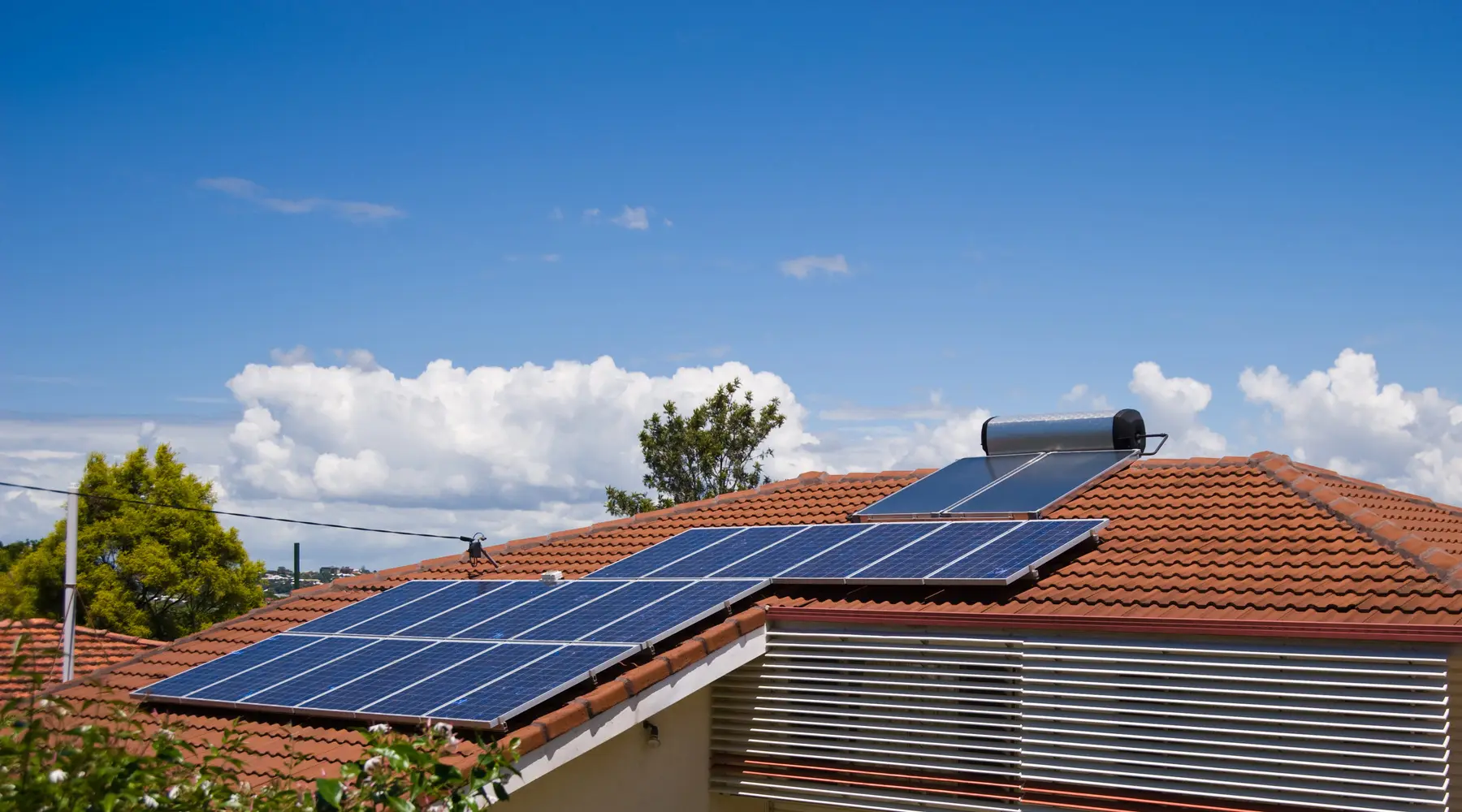Home solar: 7 big questions answered

From solar panels and battery storage to installation costs and rebates – we've got the answers to your big solar questions.
 Sponsored by Brighte. Get solar sooner with Brighte's 0% interest finance and network of over 2,000 trusted tradies. Borrow up to $30,000 and repay it with fortnightly instalments.T&Cs apply.*
Sponsored by Brighte. Get solar sooner with Brighte's 0% interest finance and network of over 2,000 trusted tradies. Borrow up to $30,000 and repay it with fortnightly instalments.T&Cs apply.*
Sponsored by Brighte. Get solar sooner with Brighte's 0% interest finance and network of over 2,000 trusted tradies. Borrow up to $30,000 and repay it with fortnightly instalments. T&Cs apply.*
Australians are increasingly embracing solar. In 2001, just 118 residential solar panel systems and 10,075 solar water heaters were installed in Australia.
Last year looked very different. In 2021 372,889 solar panel systems were installed as well as 95,321 solar water heaters. Clearly, we're getting behind green energy.
Of course, switching to solar can be a big decision and most people have a lot of questions before they make the commitment. If you're in the same boat, this article is for you.
We've teamed up with solar finance provider Brighte to bring you clear answers to some of the most common solar power questions.
How much does it cost?
This is a tricky one because there are so many variables. From the size and style of your solar power system to the type of roof you have and the location of your home.
According to the Australian Energy Foundation, a 5kW solar system with good quality solar panels generally costs between $5500 to $9500.
If you want a clearer picture, it's best to get a no-obligation quote (or several) from local installers. Some businesses will even help to arrange this for you.
For example, you can request a solar quote via Brighte and you can expect to receive quotes from 3 accredited solar installers.
Can I get help paying for solar?
Absolutely.
There are several state-based and national schemes that can help with the cost of installation. For example, Victorian homeowners can receive up to $1,400 per solar panel system. In the ACT as well, you can receive a rebate of up to $2500 for installing solar.
Nationally, the Small-scale Renewable Energy Scheme provides rebates for a variety of systems, including solar panels, solar water heaters and heat pumps.
Affordable finance is also available. For example, finance provider Brighte offers 0% interest payment plans for solar systems.
Customers can borrow up to $30,000 without worrying about interest. Instead, Brighte charges a weekly account-keeping fee of $2.15*. That's $111.80 a year no matter how large your loan ends up being.
Will I still get an electricity bill?
Probably. Most people with solar panels still have to pay for some electricity. This might be because their system doesn't produce enough power to meet all of their needs.
Or, it might be because they're using electricity at night, when solar panels don't generate electricity, so they have to rely on power via the national grid.
However, installing solar panels usually significantly reduces a person's electricity bill. Data from Brighte shows that the average residential solar customer saves over $1,000 a year on electricity1.
If you want to minimise your electricity bills even further, you can install a solar battery. This allows you to store the electricity generated during the day, for use in the evening.
How long will they last?
Quality solar panels are built to last and reputable brands typically come with a manufacturer's warranty of between 10 and 15 years. Some even provide warranties of up to 25 years.
Of course, solar panels can become damaged due to severe weather (often hail) or falling trees or debris. Commonly, solar panels are covered by home insurance but you should always check with your insurer.
In some cases, you'll have to let your insurer know you have solar panels or may have to add-on coverage.
Will they work when it isn't sunny?
Australia is perfect for solar as we're lucky enough to enjoy a high number of sunny days. Even more than that, according to research from Geoscience Australia, the Australian continent has the highest solar radiation per square metre of any continent.
However, for those in the cloudier corners of the country, there may be some hesitations around installing solar panels.
Reassuringly, solar panels still work when the sun isn't shining directly on them. According to the US-based Environment and Energy Study Institute, solar panels can still operate at up to 80% of their maximum output during partly cloudy weather.
Is my house suitable for solar panels?
Probably. As long as the location of your solar panels isn't in the shade for the majority of the day, it's likely you'll benefit from solar panels. However, placing solar panels under dense trees or foliage (which will obstruct the sun) should be avoided.
As always, it's best to speak to an expert - remember, you can request no-obligation quotes through Brighte and the qualified tradespeople will be able to give you better insight into the viability of solar for your roof.
Not only will they be able to provide advice on the ideal location, but they'll also be able to calculate the best angle for your solar panels so they receive the most sunlight throughout the day.
How do I install solar panels?
You'll want to leave that one to the experts. A couple of decades ago, finding a tradesperson qualified in solar installation might have been a tough task. Now, there are skilled installers all over the country.
Solar finance provider Brighte currently works with a network of over 2,000 trusted tradies. When you request a quote, 3 tradespeople from your local area will be notified to get in touch and talk about the details.
 Sponsored by Brighte. Get solar sooner with Brighte's 0% interest finance and network of over 2,000 trusted tradies. Borrow up to $30,000 and repay it with fortnightly instalments.
Sponsored by Brighte. Get solar sooner with Brighte's 0% interest finance and network of over 2,000 trusted tradies. Borrow up to $30,000 and repay it with fortnightly instalments.
Sponsored by Brighte. Get solar sooner with Brighte's 0% interest finance and network of over 2,000 trusted tradies. Borrow up to $30,000 and repay it with fortnightly instalments.
Compare other finance options here
*T&Cs apply. Fees, terms and conditions and credit approval criteria apply.
- Deloitte Access Economics - Brighte Consumer and Vendor Study 2019
